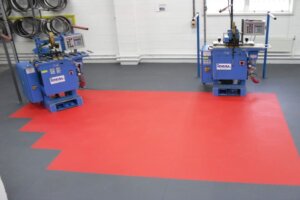A Comprehensive Guide to PVC Mats: Your Durable and Versatile Flooring Solution
Warehouse Floors and needs

Warehouse floors, being one of the components of the complex, carry the heaviest loads. Industrial terminals and modern cargo terminals must meet the requirements of users. In particular, the floors must not only meet the specified strength standards, but also withstand mechanical loads, withstand wear and temperature fluctuations, and have many other properties.
warehouse floor requirements
Warehouse floors are subject to severe wear during operation. Abrasive particles of various fractions are present on the wheels of conventional and special equipment, and shoe soles, and therefore the coating must be not only durable but also must be guaranteed to meet several requirements:
wear caused by abrasion Corrosion leads to the appearance of pits and depressions on the coating, which in turn impairs performance. This increases the risks of collapsing shelves and bodily injury to employees.
Industrial floors are subject to maximum wear and tear in traffic, cornering, work areas, and more. Here it is necessary to apply a coating with high characteristics of strength and practicality. The greatest danger to warehouses is loaded trolley structures with small diameter wheels of the “role” type, which, among other things, create shear stresses in the surface layer of the floor layers.
Impact resistance – a mandatory requirement for floors. The specifics of the work is that heavy objects often fall on the coating, so the protective layer must be especially strong so that no mechanical impact does not violate the hardness of the floors.
Resistant to chemical and aggressive environments. Current industrial production results in many oils, paints, organic and chemical solvents appearing in warehouses and other liquids that tend to spill. The load on the coating increases several times, which means that the floors of warehouses must have a protective layer that protects the base from damage, while the aesthetic appearance of the surface is important.
Production processes allow working in both high and low-temperature conditions. The difference in position is one of the main reasons for the destruction of the coating. When choosing a base, it is necessary to take into account not only the constant operating temperature but also the possibility of local increases/decreases.
For example, cleaning or opening the external hatches in the cold season, when the load on the floor increases several times. Water-resistant coatings are the main requirement for flooring in stations. Impermeability determines the indicators of the possibility of wet cleaning, the effect of any liquids on the base, etc.
Crack resistance. This property increases the life of the floor, and also improves the shock-resistant properties of the coating.
Anti-slip. Warehouse floors that do not meet specifications are not suitable for buildings. The requirement must be fulfilled both in the dry state of the base and in the wet state, otherwise the risk of injury to workers increases several times.
Fire Safety Fire prevention has been offered to all warehouse floors, so no wooden bases or their elements are allowed in the warehouses. Increased requirements are imposed on the floors in the evacuation area, exit and entrance groups.
Noise absorption is mandatory in cases where warehouse work involves the transportation of goods by special equipment, during periods of repair or renovation of areas.
Additional requirements for floors in warehouses
In order for industrial floors to be not only durable but also practical, it is necessary to comply with additional conditions that are required for certain types of structures.
- UV resistant. This is an indicator for warehouses with magnificent glazing and structures without a roof;
- Antistatic is required when storing highly sensitive equipment;
- Industrial warehouses are often the customer service area, so the comfort in such premises is also necessary;
- Ease of cleaning is essential to maintaining cleanliness.
In addition to quality requirements, floors in industrial warehouses should have a long service life and ease of operation. This means that the foundation is selected taking into account the need for local renewal with the possibility of quickly operating the territory.
In addition, the factors of dynamic and static loads, working temperature and humidity, base thickness and cleaning mode must also be taken into account. And, of course, the price of the floors is important, which affects the quick payback of all works.
Floor options and prices
Industrial floors can be coated with Polymerstone-1 single-component polyurethane enamel (from $50). To form a durable protective layer, the protective layer is easy to care for, while it is wear-resistant and has a long service life.
The most important quality of a self-leveling floor is the ability to renew the coating at any time. It is enough to prepare the base and level it in places where the load is especially high, buy the composition and package it according to the instructions.
Quick-drying, the ability to quickly run the warehouse, an affordable price category and the implementation of the work cycle on our own without the participation of specialists are additional advantages of self-leveling floors of warehouses and stations. The load that such a base can withstand is several times stronger than the usual concrete floors.
Warehouse floors are the most frequently used and loaded elements of complexes and stations where various goods are stored, stored, and transported (including heavy loads, oversized equipment, spare parts and aggressive chemicals).
This Post Has 0 Comments